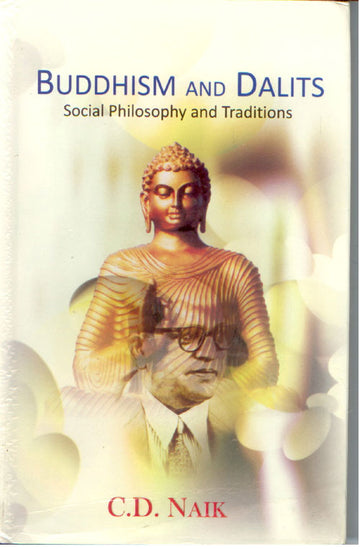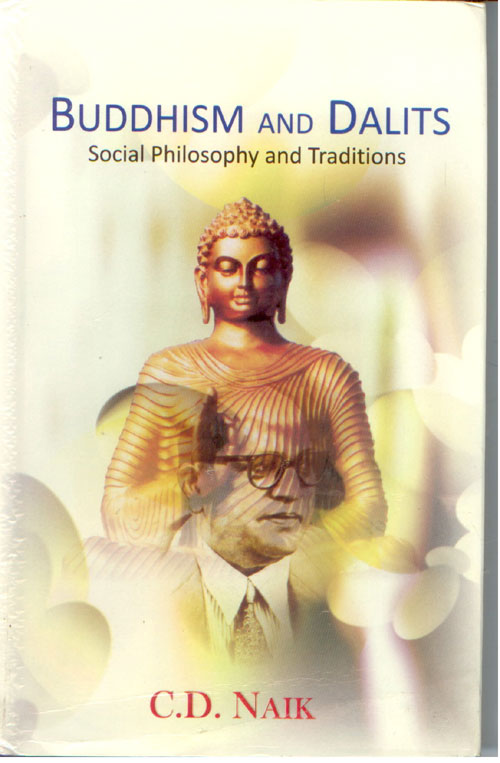Budhism and Dalits
Regular price
₹ 893
Sale price
₹ 893
Regular price
₹ 960
Unit price
Save 7%
Tax included.
| Item Weight | 400 Grams |
| ISBN | 978-8178357928 |
| Author | C. D. Nayak |
| Language | English |
| Publisher | Kalpaz Publications |
| Pages | 320 p |
| Book Type | Hardbound |
| Dimensions | 25 X 15 X 5 |
| Publishing year | 2009 |
| Return Policy | 5 days Return and Exchange |

Budhism and Dalits
Product description
Shipping & Return
Offers & Coupons
Buddhism and Dalits : Social Philosophy and Traditions highlights the social, religious, political, Legal and Secular matters of life according to Dr. Ambedkar`s teachings. It offers Research works with conclusions and suggestions on Buddhist Minority problem in Maharashtra State and application of Dr. Ambedkar`s thought to social Organizations observed in Scheduled Caste associations in Madhya Pradesh. It has penetrated into the Buddhist Marriage traditions and succession Act issues and perused the legality and the Recognition by the Indian Society for the same. The book touched on educational problems and its remedial provisions, Pali language, significance of social Buddhism, Om Mani Padme Hum like Tantra practices, social works and real hurdles and contributions of Dr. Ambedkar as Law Minister, Buddhist Scholar and visionary builder of Bharat into casteless, exploitation-less, gender-bias-less, egalitarian society. It is a source of contemporary socio-economic-educational, Cultural and historical Biography of Buddhism viewed from the social change agents of Dalits in the background of various other thought currents and traditions, Philosophies and practices prevalent in the existing situations in India. Contents:- CONTENTS:- # Preface: Acknowledgements: Introduction: List of Contributors: 1. Rise and Decline of Buddhism : History 23: The Rise, Fall and Revival of Buddhism—Asoka’s: Contribution to the Spread of Buddhism—Mahinda—: Ancient—Decline of Buddhism in India—The Rise and: Decline of Buddhism’s Indian Social Base—Mahmud: of Ghanzi—Muhammad of Ghor: 2. Globalisation and Dalits 41: Globalisation in India—Position of Dalits—IMF and: World Bank—Structural References—Economic Crisis: World Over—Status—Effects of Globalisation: Philosophy on India—Inflation—Employment—Impact: of Poverty—Impact on Society—Impact on: Educational Institutions—Impact on Reservation—: Impact on Education—Impact on Atrocities on Dalits: and Weaker Sections—Impact of Caste and Culture—: Exceptions to the Trend of Decline—Globalization,: Agricultural Crises and Socio-Economic Justice from: Ambedkarian Paradigm—Ambedkar’s Philosophy—: World of Righteousness—Revolution in Antique Vs: Modern Society—Findings—Suggestions—References: 3. Social Message of Buddhism 61: Social Message of Buddhism—Democracy, Religion: and Society: Meaning—Asian World Contribution to: Buddhism—Major Schools of Buddhism—History of: Buddhism’s Growth—Ambedkar’s Role in Buddhism—: Growth of Buddhist Movement—Ambedkarite: Buddhist Society—Ambedkar and His Contribution—: 6 Buddhism and Dalits Social Philosophy and Traditions: Theories of Observation, Meaning and: Understanding—Positive and Negative Trinity in: Buddhism—Culture of Buddhism in Contemporary: Society—Contribution of Buddhism to Society—: Breakthrough in Knowledge of Unconscious—Ethics: of Buddhism—World Buddhist Leaders and: Ambedkar—Future Prospects and Role of Buddhism—: Socio-Economic Equality Model of Ambedkar—Vedic: Society—Panchasheel—Eightfold Path of Buddhism—: Conclusion—Recemmendations and Suggestions—: References: 4. Sociological Aspects of Buddhism 107: Reviving Cultural Heritage—Poverty and Social: Atrocities Inter-relationship—Dalits Literacy: Scenario—Ambedkar’s Gujarat Experience and: Struggle—Pioneers of Buddhist Thinking—Education: as an Unequalizer: 5. Buddhist Tantra 115: Philosophy of Buddhist Tantra—Symposium in: Memory of Csoma de Koros–March 2009—: Disappearance of Buddhist Schools—Philosophy of: Tantra—Mantrayana—Meditation—Mandala: Unification—Buddhism in Tibet : History—Prajna and: Shakti—Concept of Absolute—Hinayana and: Mahayana Nirvana—Paramitas—Hermeneuties—: Creator God—Paradoxes—Practices—Goal and Way: Out—Uniqueness of Buddhism—Contemporary Value: of Buddhism—Future—References: 6. Buddhist Marriage and Method 147: Laws of Manu—The Buddhist Marriage Rite—The: Principles of Marriage—Introduction of Bride and: Bridegroom—Ills of the Marriage Ritual—The: Buddhist Conversation by Taking the 22 Vows—The: Twenty two Vows—Ceremonial Exercise—Discourse: on the Beatitudes—The Wedding of Viskha—: Interpretations of Ten Admonitions to Visakha—Eight: Boons to Visakha by Buddha—The Discipline for: Girls—The Blessing—The Buddhist Attitude towards: Marriage—Golden Rule : Never let Passion Override: Compassion May all being be well and Happy: Introduction 7: 7. Buddhist Marriage and Succession Act 2007 171: Concept and Evolution of Buddhist Law—Who is a: Buddhist?—How is a Buddhist Separate and Distinct: from a Hindu?—Dr. Ambedkar’s Initiation into: Buddhism—The Diksha—Why do Dalits Embrace: Buddhism?—Sources of Buddhist Law—The Noble: Eight-fold Path is—The Five Precept are—Tripitaka—: What is Dhamma?—Distinction between Dharma: (Religion) and Dhamma—Which is a Holy Book of: Dhamma?—Statement of Object and Reasons—Facts: and Details—Validity of Marriage by Converts to: Buddhism in Absence of Saptapadi and Lajjahoma—: Hindu Marriage Act (25 of 1995) S. 7 and Penal Codes.: 494—In the Same Judgement in Para 13—Buddhist: Marriage: Need for Codification:—Buddhist Marriage: and Succesion Act, 2007—The Buddhist Succession: Act-2007: 8. Deeksha Bhoomi of Ambedkar 199: Nagpur’s History—Need for Political Protection of: Minorities Proposed by Ambedkar—Starte: Committee—Eligibility Criteria—Principle of: Reservation—Buddist Converts as Weaker Section—: The Buddhist Community : Status and Difficulties—: Poverty Level—Unemployment—Summary: Significance of Study—Objective of the Study—Time: and Budget—Nagpur Population Constituents—: Summary—Hindu Castes—Marriage Custom Among: Hindus—Summary—Polygyny—Dowry—Marriage: Enactments—Fertility—Religious Demography from: 1951-61 to 1991-2001 and Political Consequences—SC: Population 1991—Buddhist Population—Mahars—SC/: ST Commission’s Observation on Status of SCs and: STs—National Removal of Untouchability—Buddhis: Population Growing in India—Media Black out on: Dalit News—Crime against Dalits—Handover to: Buddhist Management the Mahabodhi Mahavihar : A: Request—World conference Against Racism : Indian: Govt Stand—Committee on Elimination of Racial: Discrimination (CERD)—Conspiracy against Buddhist: Political Share as of 2008 for Representing the: Buddhists—Primary Source and Data Analysis for the: Contents: 8 Buddhism and Dalits Social Philosophy and Traditions: Project Report on Status and Problems of Buddhists: Minority in Nagpur—Profile of the Respondents : Agewise: Distribution of Respondents—Educational Status: of the Respondents—Occupation of the Respondents—: Problems as Stated by the Respondents—Problems—: References: 9. Ambedkar’s Spirit of constitution and Social: Organisation 247: Ambedkar as Law Minister—Ambedkar’s Appointment: as Law Minister—Presenting the Draft Constitution: before the Constituent Assembly—Resigning from: Nehru’s Cabinet—Dr. Ambedkar’s Published Works—: His Contribution to the Chapter on Fundamental: Rights—Reservation for Backward Classes in Public: Services and Educational Institutions—His: Contribution to the Chapter on the Directive: Principles of State Policy—Press Act: Section 4—: Public Safety Laws made by Supreme Court—: Constitution of India Vs Constitution of USa—: Limitations of Fundamental Rights—Interpreting the: US Constitution—Interpreting the Indian: Constitution—Social Organizations—Organizations: Established by Dr. Ambedkar and their Objectives and: Programmes—RPI—BSP—Findings on Application of: Ambedkar’s thoughts in Social Organization in: Indore, Ujjain and Dewas Districts—Suggestions/: Recommendations—References: 10. Educational Policies and Programmes for: Dalits : Present 267: Contribution to the University Reforms Committee—: Contribution to Bill on Education Grants—Minimum: Level of Competency Goal—The Starte Commission—: Importance to ‘Shil’ : Good Character—Hindu Code: Bill and Women Empowerment—Designing of: Fundamental Rights in Provisions Relating to: Abolition of Untouchability—Propagation of Education: Among Weaker Sections—Education Commission and: Policies—Education Policies and Programmes for: Weaker Sections—Pre-Matric-Post Matric: Scholariships for Weaker Sections—Construction of: Hostels—National Overseas Scholarships for SC: Introduction 9: Students—Drawbacks—Rajiv Gandhi National: Fellowship—Present Scenario in Education System—: Privatization of Education : Impact on Dalits—: References: 11. Pali Grammar 287: Legal Code : Books in Pali Text—Pali Literature and: Grammar—I-tsing’s Testimony on Role of Panini’s: Grammar in Indian Education—Post-Buddhist: Literature—Ambedkar’s Pali Dictionary—: Conclusion—References—Other Sources: Bibiography 297: Index. The Title 'Budhism and Dalits written/authored/edited by C. D. Nayak', published in the year 2009. The ISBN 9788178357928 is assigned to the Hardcover version of this title. This book has total of pp. 320 (Pages). The publisher of this title is Kalpaz Publications. This Book is in English. The subject of this book is RELIGION / PHILOSOPHY / Scheduled Castes / OBC / Minorities. Size of the book is 14.34 x 22.59 cms Vol:-
- Sabr– Your order is usually dispatched within 24 hours of placing the order.
- Raftaar– We offer express delivery, typically arriving in 2-5 days. Please keep your phone reachable.
- Sukoon– Easy returns and replacements within 5 days.
- Dastoor– COD and shipping charges may apply to certain items.
Use code FIRSTORDER to get 5% off your first order.
You can also Earn up to 10% Cashback with POP Coins and redeem it in your future orders.








